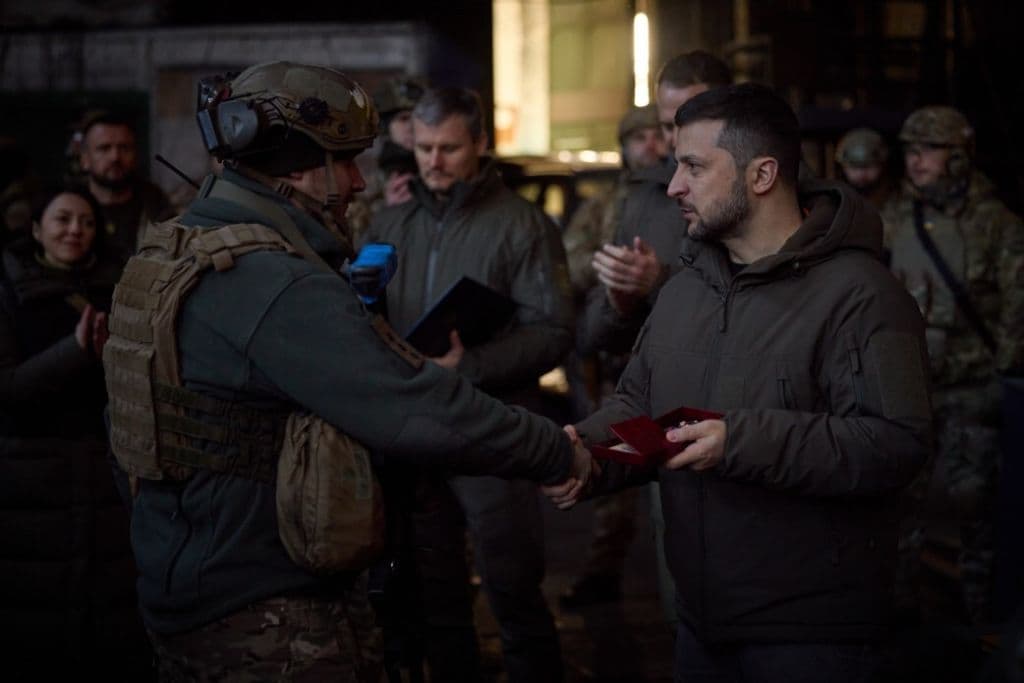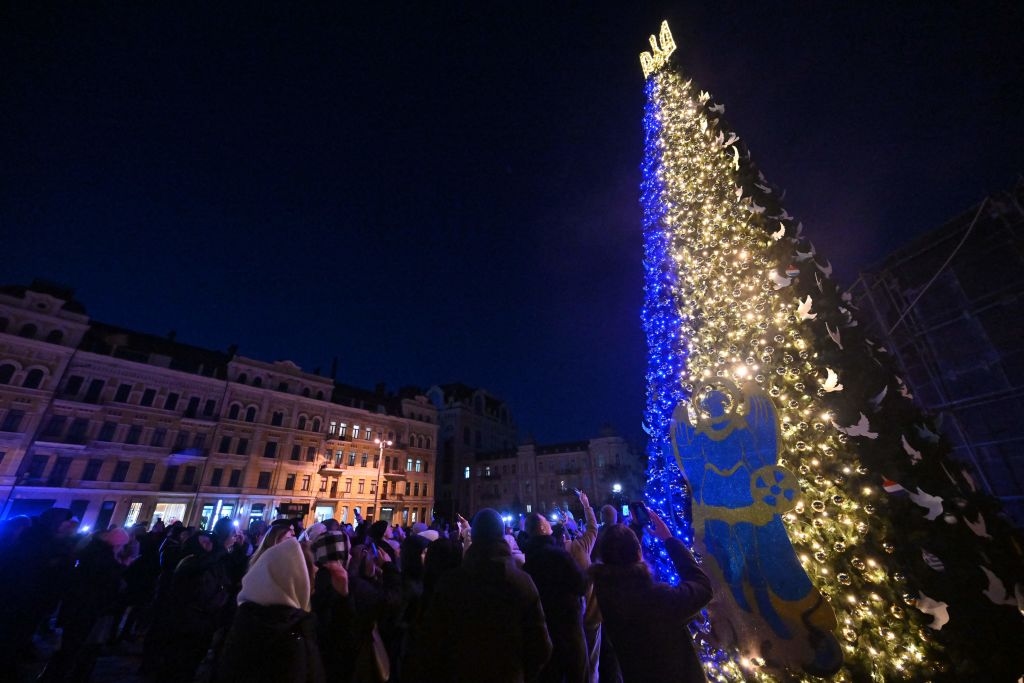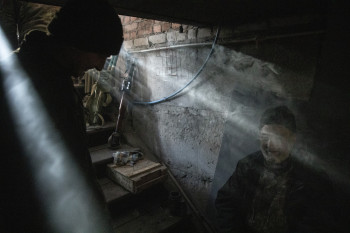Ukraine war latest: Zelensky visits front-line Bakhmut, Ukraine urges world to recognize Wagner as terrorist organization

Key developments on Dec. 20:
- Zelensky makes surprise visit to Bakhmut, meets front-line soldiers
- Kuleba: Wagner Group should be recognized internationally as ‘terrorist organization’
- Governor: 80% of Kyiv Oblast left without electricity
- EU's Borrell calls on Iran to ‘immediately stop military support to Russia’
President Volodymyr Zelensky made a surprise visit to Bakhmut on Dec. 20, handing out awards to front-line servicemen braving Russia’s deadly assault toward the city in sub-zero temperatures.
As the epicenter of the battle raged around Bakhmut, “the president awarded the brave and indomitable defenders firmly holding our eastern fortress,” Deputy Defense Minister Hanna Maliar said.
Maliar, who visited Bakhmut with Zelensky, dubbed the city “a symbol of Ukrainian resistance and invincibility” and praised servicemen for holding the defense months into Russia’s all-out offensive to capture it.
The unannounced visit comes as a brutal trench warfare unfolds nearby, largely reducing Bakhmut, once home to 70,000 residents, into rubbles.
Ukraine’s Eastern Military Command spokesman Serhiy Cherevaty claimed earlier in December that Russia was losing 50-100 soldiers daily in the Bakhmut area. The loss of Ukrainian troops, however, is also expected to be high.
For five months, Russia has “prioritized” Bakhmut as its main goal and likely envisions encircling the city with “tactical advances to the north and south,” the U.K. Defense Ministry said on Dec. 3.
While capturing Bakhmut could allow Russia to threaten key cities of Kramatorsk and Sloviansk in Donetsk Oblast, its highly-costly campaign has “limited operational value,” the U.K. Defense Ministry believes.
Russia’s Bakhmut assault is participated by the Wagner Group, a Kremlin-backed private military group led by Russian oligarch Evgeniy Prigozhin. The shadowy organization, made up of contractors paid to fight wars outside the army, is known for its brutality and has left evidence of war crimes in conflicts worldwide.
As casualties mount, Ukraine’s Foreign Minister Dmytro Kuleba urged the world to recognize Wagner as “a terrorist organization.” Ukraine suffers the most from its “criminal activities,” but it is “a significant security threat” in Africa, and across the globe, he said.
Earlier in December, the proxy leadership in Donetsk Oblast permitted Wagner to recruit convicts in occupied territories, according to the Ukrainian military's National Resistance Center.
“We must immediately recognize them as a terrorist organization,” Kuleba said at a briefing on Dec. 20.
‘Ready for any scenario’
At the same briefing, Kuleba said that Russian President Vladimir Putin’s attempt to pressure Belarus dictator Alexander Lukashenko into getting Belarus involved directly in Russia’s war against Ukraine, during their recent in-person meeting, appears to have failed.
“According to the information we have now, no critical decisions were made at this meeting,” Kuleba said of the Putin-Lukashenko talks in Minsk on Dec. 19.
Much of what was discussed during Putin’s first visit to the Belarusian capital in three years is unclear. The bilateral meeting came amid Ukrainian officials and the military’s warning that Russia could launch a new major offensive from multiple directions in early 2023, likely attempting to advance toward Kyiv from the Belarusian territory again.
While Belarus has allowed Russia to use its territory as a launching pad for its invasion, it has not directly participated in Russia’s war efforts.
However, Russia already controls several of Belarus’ military infrastructures and has some power over the Belarusian army, Kuleba claimed.
“We are ready for any scenario. No matter what they agree on among themselves, Ukraine is ready for this,” Kuleba said.
The foreign minister said another Putin-Lukashenko talks are expected in the near future.
Separately, Ukraine’s Defense Minister Oleksii Reznikov said on television that the “risk” of a potential Russian invasion from Belarus exists, but it needs time to establish a strike force there.
Russia has not formed such a group yet, according to Reznikov.

The biggest drone attack
Russia’s drone attack on Dec. 19 using 35 Iranian-made kamikaze drones to target energy infrastructure across Ukraine was the largest drone attack to date, according to Ukraine’s Air Force spokesman Yurii Ihnat.
“Yesterday, as you know, on St. Nicholas’ Day, the Russians greeted us by launching the largest number of Shahed drones in Ukraine,” Ihnat said at a briefing.
Following the attack, state grid operator Ukrenergo said that Ukraine faces a “significant” energy deficit, after enduring two months of Russia’s missile and kamikaze drone campaign to take out the Ukrainian energy system.
Kyiv Oblast Governor Oleksii Kuleba said as of noon on Dec. 20 that the situation is “critical,” as about 80% of the region is left without electricity. He had warned earlier that it might take days to restore electricity in some districts.
Meanwhile, EU Foreign Policy Chief Josep Borrell said he had a “necessary” meeting with Iranian Foreign Minister Hossein Amirabdollahian in Jordan “amidst deteriorating Iran-EU relations.”
Borrell told Amirabdollahian that Iran should “immediately stop military support to Russia” as evidence continues to mount that Iran is supplying weapons to Russia for its war against Ukraine.
Zelensky said on Dec. 19 that Russia appears to have recently received a new batch of 250 Iranian-made Shahed-136 drones from Iran. The loitering munitions have killed scores of civilians and caused blackouts across Ukraine.
Apart from drones, Moscow is also asking Tehran once again for surface-to-surface missiles as it struggles to maintain its weapon stocks, the Associated Press reported on Dec. 7, citing two unnamed U.S. and UN officials.
Despite mounting evidence, Iran has denied providing Russia with weapons following the February invasion; Moscow claims it is not using Iranian-made weapons in its war against Ukraine.











